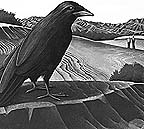Buddhism teaches that after a practitioner achieves a certain degree of realization, spiritual power develops. A person at the level of an Arhat is said to possess six supernatural powers. Even so, it is understood that it is through Enlightenment that supernatural powers are manifested, rather than that supernatural powers enhance Enlightenment. Furthermore, it is acknowledged as well that supernatural powers are not attainable exclusively JUST by Buddhists and Buddhists only. It is possible for anyone who has deep religious and spiritual cultivation to develop some kind of "super-normal powers."(source)
As some of you may have garnered by now, the person I studied under, my Mentor, studied, as did both the Buddha and the first Patriarch of Zen, Bodhidharma, under a teacher from the Indian side of things --- which I explore somewhat in ALL IS ILLUSION: A Chinese-Indian Dichotomy in Advaita and Zen. My mentor, observing my progress toward spiritual Attainment, or the lack of same as the case may be, together with my propensity toward a more stark and esotroic approach, decided the Zen route would be best for me. From that he introduced me to study-practice under the direct auspices of a certified Bodhidharma successor. All well and good EXCEPT --- purposely or otherwise on his part --- like Queen Chudala in the Yoga Vasishtha Sutra, I leaped over SIDDHIS, the supernormal perceptual states one most often confronts or experiences under slow, gradual meditation --- especially so as found and builds in Indian style meditation. When I met the Obeah and observed his abilities, for a while I was seduced by the mere power of it all. However, in the process of my apprenticeship I learned that there is a balance to things and consequences to be paid, EVEN if in the Enlightened state one is immune to the effects of Karma.[1] PLEASE SEE: Remember: The word shaman, used internationally, has its origin in manchu-tangu and has reached the ethnologic vocabulary through Russian. The word originated from saman (xaman), derived from the verb scha-, "to know", so shaman means someone who knows, is wise, a sage. Further ethnologic investigations shows that the true origin for the word Shaman can be tracked from the Sanskrit initially, then through Chinese-Buddhist mediation to the manchu-tangu, indicating a much deeper but now overlooked connection between early Buddhism and Shamanism generally. In Pali it is schamana, in Sanskrit sramana translated to something like "buddhist monk, ascetic". The intermediate Chinese term is scha-men. (source) Some people would argue quite stringently that Buddhism and Shamanism are for the most part nowhere related and to draw an anology would be creating a thin line. However, the coincidence of
characteristics and striking similarities between Buddhist adepts and Shamans and Shamanism has been studied and outlined quite thoroughly by Mircea Eliade in
his monograph, Shamanism: Archaic Techniques of
Ecstacy. For example, the abilities of the Arhat relating to the sixfold knowledge of the worthy ones that includes not only the ability similar to the Cloud Shaman to appear and disappear at will, but also the oft cited case in Buddhism and Zen by the Venerable Pindola Bharadvaja where the venerable Arhat was adomished by the Buddha for flying and performing miraculous acts infront of the faithful. Remember as well: In the world generally, the common inclination is to judge the merits and ability of a Sadhu through his Siddhis. It is a blunder indeed. They should not judge the Enlightenment of a Sadhu in this way. Siddhis are by-products of concentration. Siddhis have nothing to do with Self-realization. A Sadhu may manifest Siddhis due to strong passions and intense desires, and if that be the case, he is undoubtedly a big householder only. You must believe me when I tell you that Siddhis are a great hindrance to spiritual progress, and so long as one is within the realm of Siddhis and does not try to rise above it and march onwards, there is not the least hope of God-realisation for him. But, this does not mean that a person manifesting Siddhis is not a realized soul. There are several instances of such persons who have exhibited several Siddhis purely for the elevation and uplift of the world, but never for selfish motives. (source) Some time ago twenty-two western Buddhist teachers met with His Holiness The Dalai Lama to discuss a variety of Buddhist related issues and in response to questions on PSYCHIC POWERS SUCH AS FLYING His Holiness concluded: "As far as I know, zero Lamas today can do that. Some meditators living in caves around Dharamsala are HIGHLY REALIZED and possibly capable of such attainments." (source) It should be noted the Enlightened sage of Arunachala, the Bhagavan Sri Ramana Maharshi, has said that a Realized person may not have siddhis, but may later seek or
acquire them after realization. (i.e., Queen Chudala in Yoga Vasishtha). He also said
that some Realized persons need not have any siddhis.
SIDDHIS I
 |
DON JUAN MATUS (please click) |
| THE BEST OF CARLOS CASTANEDA | |
SEE:
POWER OF THE SHAMAN
HERE FOR
ENLIGHTENMENT

ON THE RAZOR'S
EDGE

THE ABOVE BY:
the Wanderling
PRESENTED BY:
Upaka the Ascetic
